3 ways to win Milano-Sanremo
Three former winners of the race, Chiapucci, Fondriest, and Pozzato, along with eight international journalists analyse the first Monument of the year and Pogačar's chances.
Cycling is a sport that simmers slowly.
In tennis there’s constant rallying, and someone wins or loses every 20 seconds. Same in basketball. Football, though, didn’t become the world’s dominant sport just because it’s popular and easy to play anywhere. Its thrill comes from the fact that goals are rare, sometimes so rare they never even happen. In Milano-Sanremo, the goal always comes, and even though we know it’s coming, it still feels as good as a last-minute winner away from home.
Some say Sanremo is boring, but for me it’s the only race that genuinely makes my heart beats faster. That’s not a journalistic trick or an exaggeration: I actually get nervous. And the funny thing is I don’t even care that much who wins. If watching the best 40 minutes of cycling of the year means sitting through 6 hours of build-up, I’d say that’s a pretty cheap price to pay. Way better odds than life usually gives us.
For the first Monument of the season, I spoke with 3 former winners, Claudio Chiapucci, Maurizio Fondriest and Pippo Pozzato, and 8 journalists and analysts from around the world to get their take on the race.
Because yes, Sanremo is the easiest to race, but the hardest to win. And with the Pogačar factor shaking things up, the tactical options are wider than ever.
Claudio Chiapucci: the last daredevil of Sanremo
‘El Diablo’ won Milano-Sanremo in 1991, securing the biggest victory of his career just months after finishing second in the Tour de France. He was the last long-range attacker to win the Classicissima, launching his move on the descent of the Passo del Turchino, more than 100 km from the finish. In today’s cycling, such a feat seems impossible.
"It’s a very special Classic, nearly 300 km long, but what can make it even more unique is the weather", says Chiapucci. "If it rains, it can be a really tough day".
"Pogačar has a really strong team, and I think he’ll try to win from far out rather than waiting for the Poggio", he says.
— You were the last madman to go for it from so far.
— “It was a day with heavy rain, and I decided to attack on the Turchino descent. There were no race radios or live TV coverage, so I thought the peloton would split… But I don’t think the race will break up there now. For me, the key point is Cipressa”.
Chiapucci sees two key moments when Pogačar could attack:
"He could go at the start of the Cipressa. And if that doesn’t work, he’ll try at the foot of the Poggio. What he can’t do is wait until the end of the Poggio like in previous years, because it’s not long or hard enough. He has to go from the bottom"
"Everyone assumes Pogačar will win, but I think it’s still a wide-open race". For Chiapucci, the main rival is Van der Poel, especially if the weather turns bad. He also highlights Pedersen, Ganna, and Pidcock, though he has more doubts about the latter despite his strong form.
Maurizio Fondriest: The way Pogačar dreamed of
The Sanremo that Pogacar has attempted over the last 3 years. That’s how Fondriest won the race in 1993, attacking in the final stretch of the Poggio before going all-in on the descent. Fondriest, however, took advantage of a previous attack to launch his counter-move. In cycling’s battlefield alliances are crucial, even if they end up being unintentional.
The 1988 World Champion shares his insights on the race and tells me about his experience on Wednesday 19th, when he was out on the Sanremo recon with Tom Pidcock and Vincenzo Nibali, Q36.5’s ambassador.
“We rode the last 40 kilometres of the race: Capo Berta, Cipressa and Poggio. Pidcock is in great shape and the lightest of the favourites, just 58 kilos. He’s very fast, climbs well, but in the final km of the Poggio, they’re going at almost 35 km/h… If he can hold the wheel, he might have a chance on the descent, where he can really make a difference. But Pogačar and Van der Poel are also strong downhill”
Fondriest doesn’t believe that the crash in Strade Bianche will change Pogačar’s approach to descents. He was also there when the Slovenian reconned the final part of the race.
“For me, he’s just as much of a favourite as Van der Poel. They’re the ones who can make the biggest difference on the Poggio, but we’ll have to see what happens on the Cipressa. UAE already tried to go full gas on Cipressa last year, but in the end, Pogačar didn’t have teammates left on the Poggio. They’ll probably use two riders to push hard on Cipressa, but keep Del Toro and most likely Wellens fresh for the Poggio”.
“Van der Poel made the difference on the Poggio last year, and after Philipsen’s crash, he’ll be the team’s only leader. The other two contenders to win are Pedersen and Ganna, who was incredibly strong in Tirreno-Adriatico, climbing really well”.
Even if Pogačar and Van der Poel can’t break away, Fondriest doesn’t expect a large group to make it to the finish together. That said, his favourite for the victory is Van der Poel.
Filippo Pozzato: the art of the counterattack
After the selection on the Poggio and breaking away with some of the favourites, Pozzato waited until the last 400 metres to launch his counterattack after an attempt by Samuel Sánchez, among others. Despite everyone keeping an eye on his teammates Bettini and Boonen, Pippo proved to be the smartest of the bunch in the 2006 edition. Because cycling doesn’t always reward the strongest. And La Primavera even less so.
“The only way Pogačar can win Sanremo is by doing something truly remarkable with his team. From the Turchino, they need to go full gas, attacking Cipressa as if the finish line were at the summit. But not just in the way it's been talked about for years. People always say this is the key to winning, yet no one has ever dared to try it. I believe he has both the courage and the team strength to make it happen”
“If they manage to completely break up the group on Cipressa, then Pogačar can try to make the difference on Poggio, although I think it will be difficult for him. He’s an extraordinary rider, capable of winning anything, but I see his victory as more challenging. My favourites are Van der Poel, Ganna, and even Pedersen, who I believe is in great shape”.
For Pozzato, a rider like Ganna could adapt well to the race scenario that UAE is likely to create: “In a race where UAE makes it truly tough and demanding, Ganna could take advantage. He has proven to be strong on the climbs and fast in the final sprint. He could also attack if a group of five or six riders reaches the final stretch”.
“For Pogačar, it will be really tough, but not impossible, because a champion like him is always capable of putting on a show. I think he’ll go all-in, take a gamble, and push to break the race so that no sprinter reaches the bottom of Poggio. In my view, he needs to reach Poggio with just ten or, at most, twelve riders who have survived Cipressa”.
Stefano Rizzato (RAI) | Italy
“The easier one to ride, the hardest one to win. Everyone says the same about Milano-Sanremo and rightly so. It's a stereotype, and still true”.
For Stefano Rizzato, Sanremo is a race where drafting plays a crucial role, as well as saving watts: “Every rider knows the perfect path to win it: save as more energies as one can in the build up to the Poggio climb, follow the wheels until the hardest part, and then attack, stay away, win solo. Or, if you are a sprinter, follow, follow, follow, hope in someone else to chase the attacks, dash to take it in via Roma”.
“At least 50 riders are virtually capable of winning Sanremo, but the key is not in the legs: it's in the mind. If you want Sanremo too much, you won't have it. You have to be prepared to lose it, to play it like it's a game, like this race means absolutely nothing”
“Last year Pogačar came to me for the flash interview after the race, and just that one time it was a different Tadej. He was pissed, and sincerely showing it. "I'm starting to lose patience on this race", he said. "Better next year I don't end up second, or I don't know what I'll do", he added. He wants it wildly. And he's used to get whatever he wants”.
“I don't think the Poggio is enough to drop MvdP, Ganna and Pidcock (and Pedersen?). UAE could climb Cipressa under 9 minutes, but still it might not have the influence they hope on the race”.
“Everyone says it's impossible in today's cycling to drop everyone on Cipressa and stay away until the finish line. What I think is that Tadej could do it, and it could be his best shot at Sanremo”.
Despite the inherent difficulty of the race, the uncertainty of tactics, and the wide range of contenders, Rizzato sees Pogačar as the favourite, followed closely by Pippo Ganna.
Cillian Kelly (The Backpedal) | Ireland
In line with what Stefano Rizzato told me, Cillian Kelly also believes that Milano-Sanremo is very much like a poker game:
"I think the key to winning Milan-Sanremo is convincing everybody beforehand that you're not a serious contender to win it".
“This worked for Mark Cavendish in 2009. He convinced everyone that he was only there to gain experience. On the day, he surprised everyone. He remains the last rider to win this race on his debut. Vincenzo Nibali rather did the same in 2018. He had tried so many times to attack on the Poggio, tried and failed, that when he did it again, there was enough doubt sewn in the subconscious of rivals that this wasn't an attack that would work”.
“The opposite being the case caused Peter Sagan to never win this race. It's a race that should have been perfect for him… But every year he showed up, he was the overwhelming favourite to win”.
“For Pogačar to win he needs to attack once, and once only. Until now he has attempted to blast his way clear with a series of punches on the Poggio. Each of which might have been enough to knock out some of his rivals, but never enough to knock out all of them”
For Cillian Kelly, until Philipsen’s crash, he was the favourite, as he could play tactically with Van der Poel while waiting for his moment in the sprint.
Lionel Birnie (The Cycling Podcast) | UK
For Lionel Birnie, the key to Milan-Sanremo is “timing and positioning”.
“It's a battle between riders who want to get away and teams who want to keep it together for a sprint and so I always think the teams that have the greatest influence are those who have an attacker and a sprinter, for example Alpecin-Deceuninck with Van der Poel and Philipsen”.
“A sprinter can lose the race on the Cipressa or Poggio by being in the wrong place and having to spend extra effort to stay in the game. It's why the weather and wind speed/direction can play an important part. A tailwind on the climbs and/or coast can tilt the advantage towards the attackers”.
“As Larry Warbasse said in The Cycling Podcast this week, Pogačar and his team need to make the race hard for as long as possible. Larry suggested Pogačar should attack on the Turchino, not necessarily attacking there to win but attacking to put everyone else under pressure a long way from the finish”
“Then he could make his move on the Cipressa or Poggio and hope to get away solo or in a very small group. Whatever UAE-Team Emirates do it'll be hard for them because there's always someone willing to chase or bridge the gap”.
For Birnie there are four main favourites: Van der Poel, Pogačar, Ganna, and Pedersen. “If I had to pick a winner, I will go for Pogačar because it would mean he has only Paris-Roubaix left to complete the set of Monuments”.
Pepe Rodríguez (PepeDiario) | Spain
For Pepe Rodríguez, Milano-Sanremo has changed its nature due to the presence and attitude of riders like Pogacar.
“The eternal debate every year. The Cipressa, the Poggio… What should UAE do? What does Pogacar need to do to drop the sprinters and win in San Remo?”
“I don’t know if he’s actually been that far in recent years. We have to remember Mohoric’s legendary descent off the Poggio. We have to recall that the year he came closest, he dropped Pippo Ganna, Van der Poel and Van Aert by a metre at the top of the Poggio, but then on the descent he couldn’t hold that gap. Has he really been so far off that he needs to change tactics? I’d say no”
"I’d say there’s no other possible tactic either," explains Pepe Rodríguez, referring to how UAE exhausted themselves last year, leaving Pogačar isolated at the crucial moment.
“Tim Wellens, Isaac del Toro… UAE has the riders to make the race incredibly hard, but there isn't enough terrain to work miracles. Tactically, perhaps the only thing to do is to stick with the same strategy and hope that in one of these years, on the Poggio, Pogačar manages to gain those two or three meters and that the chaos behind plays into his hands”.
“One key factor in this regard is Philipsen’s crash during the week, which could slightly alter the race tactically. Last year, Philipsen won thanks to Mathieu van der Poel, who, aware of his teammate's presence in the group, shut down every move at the bottom of the Poggio. That won’t happen this year”.
Despite Pepe seeing Milano-Sanremo as a very open race, full of tension in the last 40-50 kilometers, if Pogačar fails to execute his plan, his favorite is Mads Pedersen. “He’s in fantastic form, racing with great intelligence and power. If he reaches the final sprint in the front group, he’s the top contender”.
Joe Morgan (Joseph’s Cycling Substack) | UK
“Milano-Sanremo always hangs in the balance in terms of the types of riders which it suits best. There are a multitude of different factors that are key to winning a race such as Milano-Sanremo beyond being the strongest rider including tactics, weather, luck and team strength”, reflects Joe.
Regarding Pogačar’s chances, this is what Joe Morgan thinks: “In recent editions of Milano-Sanremo, the favorite hasn’t always been the one to win. More often, it’s a rider who keeps their powder dry until they make their race-winning move. You don’t necessarily have to be the strongest rider in the race to win Milano-Sanremo”.
“Very rarely can a rider ride away from the rest on the Poggio due to pure strength like Mathieu van der Poel did in 2023. This has proven to be a problem for Tadej Pogačar, as the race simply isn’t difficult enough”.
Joe thinks something similar to Pepe Rodríguez: “It’s possible that if Pogačar tries to attack every year on the Poggio, it might be successful one year, but it will be very difficult if there are riders such as Van der Poel in great form”.
Related to weather conditions, Joe Morgan thinks that “if the wind isn’t playing ball, it can make things very difficult for the attackers, like Pogačar, to make a difference on the Poggio. An ideal scenario for Pogačar is that the race splits well before the Poggio due to weather conditions making the race more attritional, because this will increase his chances at success”.
“Milano-Sanremo still requires exceptional endurance and fatigue resistance. This is an area where Pogačar has proven to be supreme. The Poggio is only 3.7 kilometres with an average gradient of 3.7%, which is relatively easy for the professionals”.
“Added to this fact is that everyone is anticipating an attack from Pogačar at this point in the climb too. He lacks the element of surprise”.
“For Pogačar to succeed, he needs to be willing to lose to race, to win it”. But Morgan presents a very interesting race scenario: the dual leadership strategy:
“It could be in UAE and Pogačar’s best interest to try and switch the tactics up. Say for instance, the team kept their powder dry on the Cipressa, and had strong numbers heading into the Poggio, a strong teammate of Pogačar could be used as a decoy to make the initial attacks and draw out the likes of Van der Poel. Jhonatan Narváez is perfect for this situation. Pogačar can then sit on the wheels and wait until he senses the perfect opportunity to attack towards the top of the Poggio”
If the weather conditions are not ideal, Morgan believes the main contenders could be Van der Poel, Pedersen, and Pidcock. However, he also mentions Kooij as a potential under-the-radar surprise.
Kārlis Ozols (Lanterne Rouge) | Latvia
“It's impossible to win without great positioning before the Cipressa and Poggio”, Ozols says. “For a big favourite, attacking like Stuyven is difficult because everyone will chase. Mohorič and Nibali managed it, but it's rare. Top-tier riders must either win a final bunch sprint or break away on the Poggio, like Van der Poel did in 2023”.
“Pogačar benefits from a very hard race, with bad weather and crosswinds increasing his chances. Otherwise, the race needs to be as intense as possible on the climbs, but even Capo Berta (1.7 km at 7%) is ridden at over 30 km/h, where the drafting benefit is too significant. UAE failed last year with positioning before the Cipressa, but soloing from there is almost impossible”
The drafting benefits on these climbs exceed 1 W/kg and Pogačar's w/kg on these climbs doesn't matter as he must get a separation first. The same applies to the Poggio. Even if he gains a small gap on the 7% section, Van der Poel and others will likely catch him on the descent. To maximize his chances, he needs as many kilojoules burned before the Poggio and a highly intense race in the final hour with no recovery periods”
For Kārlis Ozols, "Pogačar is fast in a sprint, but his best chance of beating Van der Poel is in a larger bunch rather than a direct 1v1". However, he would personally like to see Ganna take the victory to bring more variety to the list of winners in major races.
Jonas Creteur (Knack) | Belgium
Jonas Creteur believes that whatever happens will depend on the tactics of UAE. “Will they explode the bunch on the Cipressa and will they set the tempo for a time of under nine minutes?”
The record stands from 1996 of 9’19”. UAE already tried it last year, although, as Jonas reminds me, the weather could be a decisive factor this time. There is a certain chance of rain and, in principle, the wind will be tailing on Cipressa and the approach to the Poggio, which could favour an assault on the record by UAE.
“It will be necessary to avoid that a lot of riders can hang on and especially the faster riders for Pogačar to attack again on the Poggio. But the question is: if they set an incredible fast tempo in the Cipressa, how many teammates will there be left for Pogacar after the Cipressa? You need a teammate, maybe even two, to launch him again on the Poggio. Don't know if they are that strong”.
“I think that attacking on Cipressa would be suicide. Even if he takes 10-15 seconds on the top, there will be enough teammates left for other teams, like Alpecin, to close the gap or keep it steady until the Poggio. If Pogacar rides alone, he will spend a lot of energy”
Climbing Cipressa at full gas as a team and attacking on the Poggio. Enough?
“Maybe Milan or Philipsen, who crashed on Wednesday, will get dropped, but a rider like van der Poel, even if it's 9 minutes on Cipressa, I don't think he will get dropped. And even Pedersen or Ganna, who were climbing really well. The Poggio is not that hard. The last two years, Pogacar always attacked on the Poggio, but never got a gap of more than two seconds”
“Maybe that's even a smokescreen. Maybe they won't do it and they will go full on with the whole team towards the Poggio, as Caleb Ewan told Geraint Thomas”.
Creteur also mentions 'the Poggio Curse' in his latest article in Knack. “There's a curse for the top position on the Poggio. In the last 28 years, 26 times a rider who passed the top of the Poggio first didn't win Milano-Sanremo. Only two of the 28 riders who passed the top on first, won Milan-Sanremo: Nibali in 2018 and van der Poel in 2023”.
“I think van der Poel is stronger than last year. Last year was his first race of the season. That's the reason why he rode Tirreno, because he needed some competition to get that rhythm back, so I expect that van der Poel will be even better than last year when he didn't attack. He only closed the gap to Pogačar”.
“If I have to make a prediction, I'm saying van der Poel. He can do it in all sort of ways, by attacking, in the descent... And he will always beat Pogačar in the sprint if nothing unusual happens.”
Spencer Martin (Beyond The Peloton) | USA
“Sanremo is perfectly suited to today's superstar-powered version of the sport. This is because riders like Pogačar and van der Poel have the raw power to simply ride clear on harder courses, but the milder climbs of Sanremo don’t allow for this. As a result, the playing field is leveled, creating a thrilling finale where these Galácticos are dragged down into the mud with the hordes of riders just one level below”, says Spencer.
“Additionally, the course is just hard enough to give non-sprinters a chance, yet easy enough to keep the biggest Classics contenders and sprinters in the mix. Ultimately, this combination has made the final 20 kilometers the most thrilling half-hour in the sport”
“The fascinating thing about Pogačar at this race is that he is one of the only riders who can violate the general rules. His best chance of winning this year is to have his strong UAE team press the issue as early as the Turchino climb, loading up his rivals’ legs with fatigue, before going all-out on the Cipressa”.
“If he gets clear solo, he is one of the only riders with the strength to hold off the chasing pack on the stretch of road between the final two climbs”.
Although UAE and Pogačar's attacks will almost certainly come earlier than in previous years, Spencer Martin sees Van der Poel as the favorite: “He has the best combination of skills for this race”.

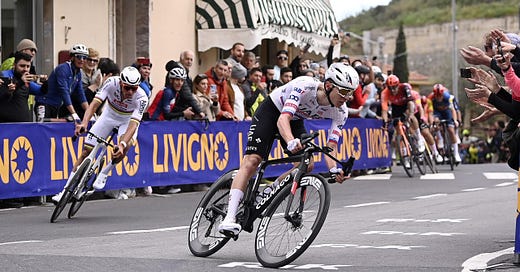


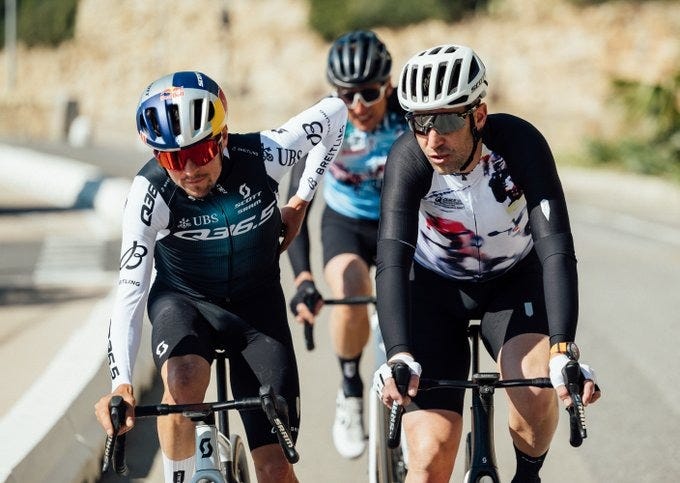
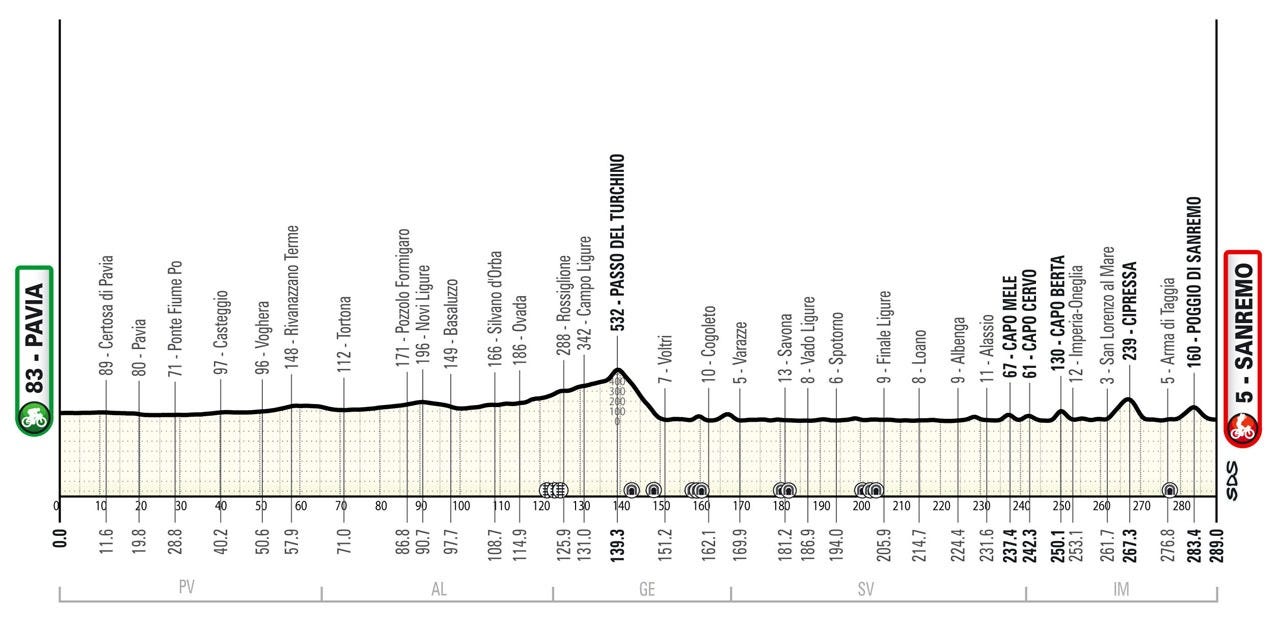
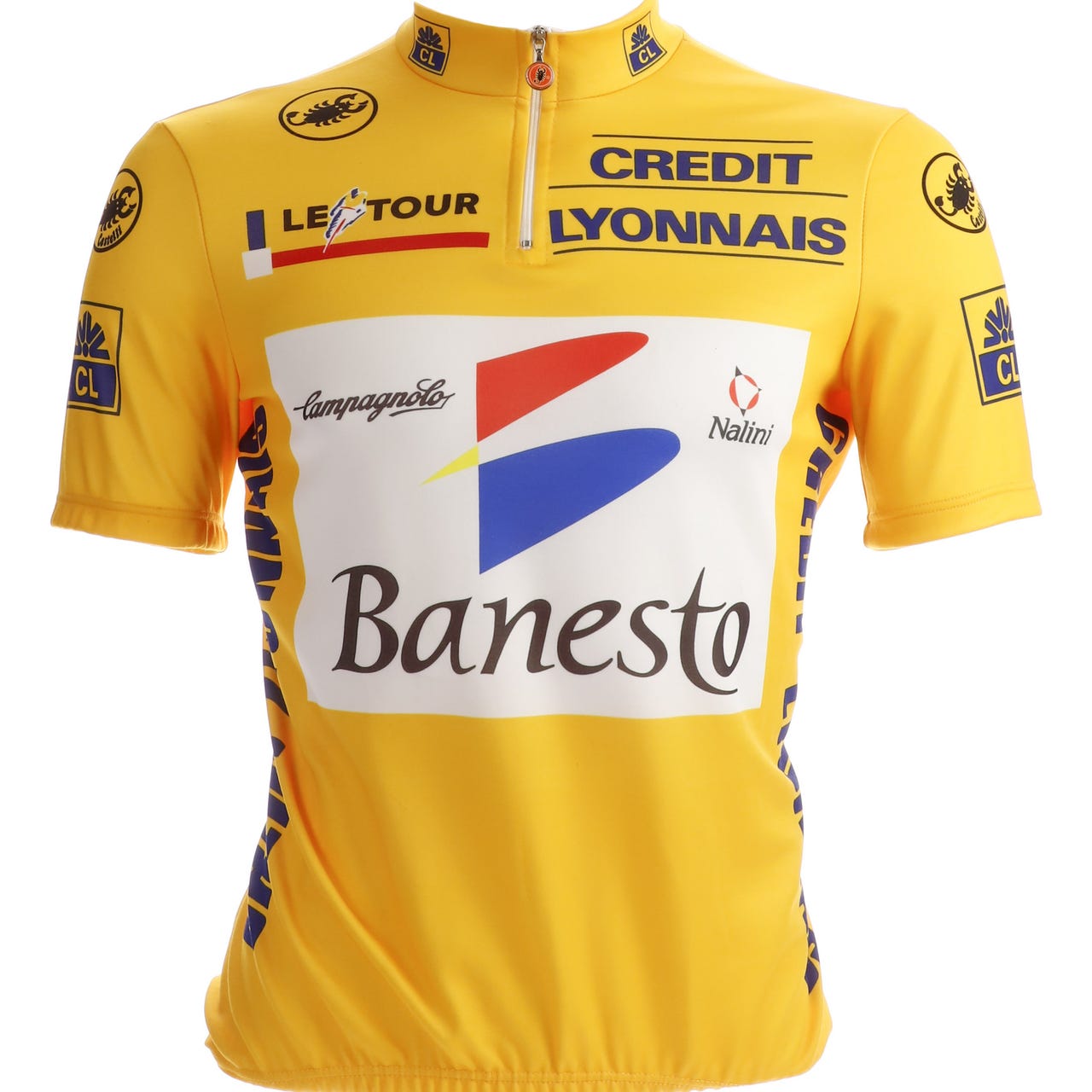


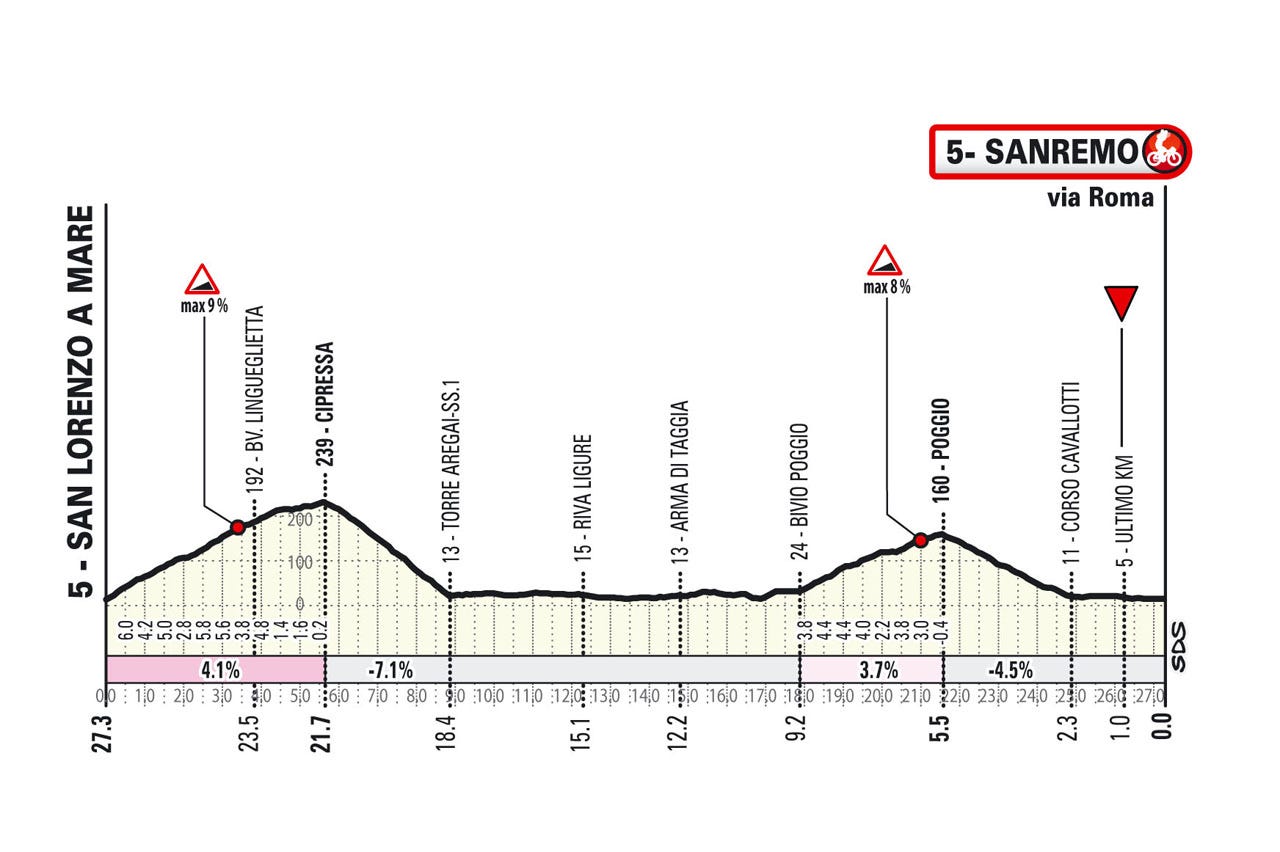

I really hoped Ganna would win. Really liked that this article is a panel of experts for the preview!